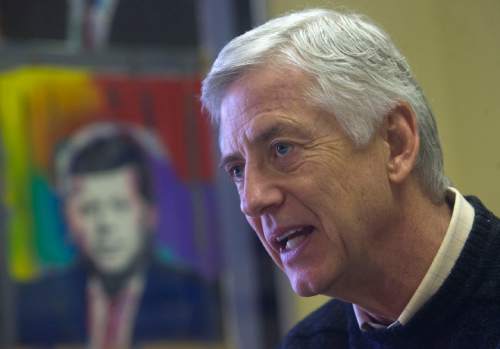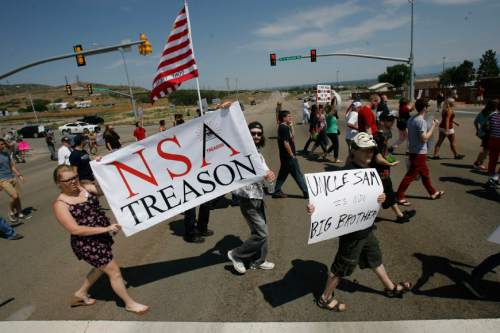This is an archived article that was published on sltrib.com in 2015, and information in the article may be outdated. It is provided only for personal research purposes and may not be reprinted.
Washington • Former Salt Lake City Mayor Rocky Anderson is planning to notify several federal agencies he will sue them if they don't settle claims of violation of privacy for an alleged dragnet surveillance program around the 2002 Winter Olympics in Utah that purportedly captured all texts, emails and data about phone calls.
And he's looking for other Utahns who want to join the case.
Anderson, a longtime critic of the federal government's domestic spying, says he will notify the Department of Justice, the National Security Agency and the FBI by Aug. 20 that he intends to sue if they don't settle all claims filed. Claimants, under federal law, could be awarded a minimum of $10,000 each if the agencies acknowledge the claimants' rights were violated or a court later rules in their favor.
Anderson also says he may sue individual agency employees who were aware of or involved in the program, which was first reported by The Wall Street Journal in 2013.
"This was the most immense, clearly illegal and unconstitutional, indiscriminate wholesale surveillance of the content of communications of people in this country by our government in our nation's history," Anderson said Tuesday, adding that it even goes beyond what former Soviet or East German security forces did to their own citizens.
"This kind of surveillance," he said, "goes beyond what the KGB and the Stasi ever engaged in."
The NSA has declined to comment on The Journal report or on any surveillance that might have occurred during the Olympics, which were staged within six months of the Sept. 11, 2001, terrorist attacks in New York City and Washington.
The Journal, citing unnamed government officials, said the NSA and FBI "monitored the content of all email and text communications in the Salt Lake City area," around the time of the 2002 Games. A top-secret inspector general's report from 2009 — leaked to The Guardian newspaper by former NSA contractor Edward Snowden — detailed an agreement between the spy agency and "Company E," thought to be Qwest Communications, to "provide call detail records ... in support of security for the 2002 Olympics in Salt Lake City."
Anderson says he was told by a former NSA senior executive — who was at the agency during the Games — that those who knew of the program called it a "golden opportunity" for the spy shop to team up with the FBI and engage, for the first time, in a wholesale surveillance of everyone within a geographic area. That included the Greater Salt Lake area and spots around Olympic venues, Anderson says.
The two agencies also collected data about phone calls — the time of calls, phone numbers and duration — and recorded the content of calls of targeted people, Anderson says, and all without a warrant.
"There has never been another instance, that anyone knows of," Anderson said, "where the United States government carved out a geographic area and, as the NSA source says to me, placed a security cone over the entire area and grabbed everything they can get."
Former Qwest CEO Joseph Nacchio, who headed the phone company during the Olympics and was later convicted of insider trading, says he wasn't aware of surveillance of his customers during the Games but that he'd be surprised "if it didn't happen."
Anderson, with his colleague Jim Lewis, says he will file a claim for anyone who was in the area during the time of the Olympics, and has set up a website rockyanderson.org/NSA/ to provide more information.
Anderson and Lewis would take 20 percent to 25 percent of any settlement.
Under the law, Anderson must first notify an agency and give it 60 days to settle a claim or deny it. After that time period, the attorney can then file in federal court.
The law sets a $10,000 per person minimum in a constitutional tort case. Anderson says that may actually apply to each instance of a violation.
Any claims must be filed within two years of the disclosure of an alleged act, so Anderson must file his claims by Aug. 20.
He is asking people who want to join the claim to get their paperwork to him by Aug. 15.
The NSA, FBI and Department of Justice did not respond to requests for comment.





